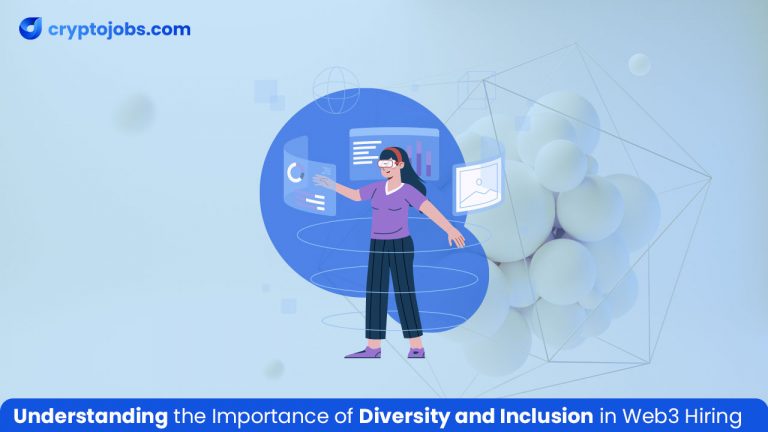
Understanding the Importance of Diversity and Inclusion in Web3 Hiring
- cryptojobs.com
- January 23, 2024
- All Posts, Employer’s Guide
- hiring
- 0 Comments
Web3 is the next evolution of the World Wide Web. It is characterized by a decentralized, peer-to-peer network enabled by blockchain and other distributed ledger technologies. Unlike traditional Web2, Web3 aims to empower users, fostering a more open, secure, and trustful environment. It leverages decentralized technologies to enable data ownership and smart contract functionalities. With continuous growth and evolution, Web3 is set on creating a new world order. Yet, how can the new world thrive if it doesn’t represent all of us?
Historically, the Web 1.0 and Web 2.0 industry has been dominated by a narrow group of individuals. But now that it is heading towards innovation and disruption, it is essential to foster a culture of diversity and inclusion. When people from various backgrounds, experiences, and perspectives come together, they form teams that are approachable, resilient, and innovative. Such teams are rich in diverse thoughts and experiences, which, contrary to the popular nice-to-have belief, are a must-have. So, it is essential to put biases aside and focus on inclusivity when hiring for Web3 jobs.
The Case For Diversity and Inclusion
The term diversity is used to signify the unique characteristics that individuals bring to a team. Inclusion, on the other hand, means creating a workplace environment where every singular person feels respected, heard, valued, and empowered to perform at their full potential. Together, they create a workspace where the differences of age, race, gender, culture, background, religion, and education are non-existent.
Both of these are closely related concepts. Together, diversity and inclusion aim to promote a culture of equality, offering equal opportunities to all individuals applying for Web3 jobs. Implementing these concepts in the Web3 hiring process is not merely a moral imperative; it is a smart business decision. Research studies show that diverse teams are more productive, innovative, and profitable than most homogenous teams. So, by bringing in diverse talent, you can make better decisions, avoid group thinking, and identify new opportunities.
Importance of Diversity and Inclusion in Web3 Hiring
When it comes to Web3, diversity, and inclusion are the foundational elements that significantly influence the success and sustainability of this industry. Let’s take a look at how they do so:
Talent Retention
When it comes to attracting and retaining top-tier talent, a diverse team has a better chance than its homogenous counterpart. Research indicates that when an employee feels included and valued, they become more engaged and motivated. And a motivated team is likely to perform better with lower levels of turnover.
This aspect is particularly important in the hyper-competitive Web3 industry. With its constant evolution, recruiters are at risk of losing their highly skilled professionals to other companies.
Market Appeal
When you cultivate a diverse and inclusive workplace environment, it makes your brand more appealing to a wider range of clients and customers. It is a way to show that regardless of their differences, your brand equally respects and values all members of society. It is a great way to maintain authenticity and build trust with your target audience. Besides, a diverse team has a better chance of understanding and serving a diverse Web3 user base, which improves their satisfaction and loyalty.
Legal Compliance
Many countries have imposed laws and regulations to ensure that the companies operating within their jurisdiction stay fair and non-discriminatory in their recruitment practices. In such cases, implementing diversity and inclusion policies in your recruitment process becomes necessary if you want to continue functioning without any legal consequences.
Blockchain technology and Web3 platforms are designed to be trustful and decentralized. So, it’s essential to prevent biases from seeping into the system.
Representation Matters
Despite the strides made, some factions of the society still remain underrepresented in the tech landscape. These biases, whether conscious or unconscious, can shape the Web3 space. That’s why it is important that everyone is properly represented. Given the industry’s reliance on the creative and innovative prowess of its workforce, recruiting diverse teams becomes paramount.
A diverse team not only ensures a broad spectrum of ideas and experiences but also cultivates a dynamic and innovative work environment. The inclusion reinforces the adaptability and creativity essential for success in the rapidly changing Web3 industry.
You may like: How to Recruit the Right Talent in The Crypto Industry
Best Practices to Implement Diversity and Inclusion in Web3 Hiring Process
If you want to keep up with the ever-evolving landscape, it is essential to embrace diversity and inclusion in your Web3 jobs. Here are the best practices:
- When creating a job description, use language that encourages a diverse range of applicants to apply.
- Expand your recruitment efforts to reach underrepresented communities. You can leverage social media and niche forums for this purpose.
- Network and collaborate with tech organizations that support diversity. You can attend conferences and events or actively engage diverse Web3 communities on social media.
- Include diverse interview panels in the decision-making process.
- Train interviewers to recognize and avoid unconscious biases.
- Develop policies and practices accommodating diverse needs and fostering an inclusive company culture.
As Web3 continues to revolutionize the digital landscape, prioritizing diversity and inclusion has become more of a strategic imperative than moral responsibility. The ethos of Web3 is intrinsically tied to principles of transparency, collaboration, and equitable participation. A diverse workforce can navigate the exciting opportunities and challenges of a decentralized future, driving innovation, resilience, and ethical development. Not weaving these principles into the fabric of recruiting processes will prevent organizations from harnessing their full potential.




